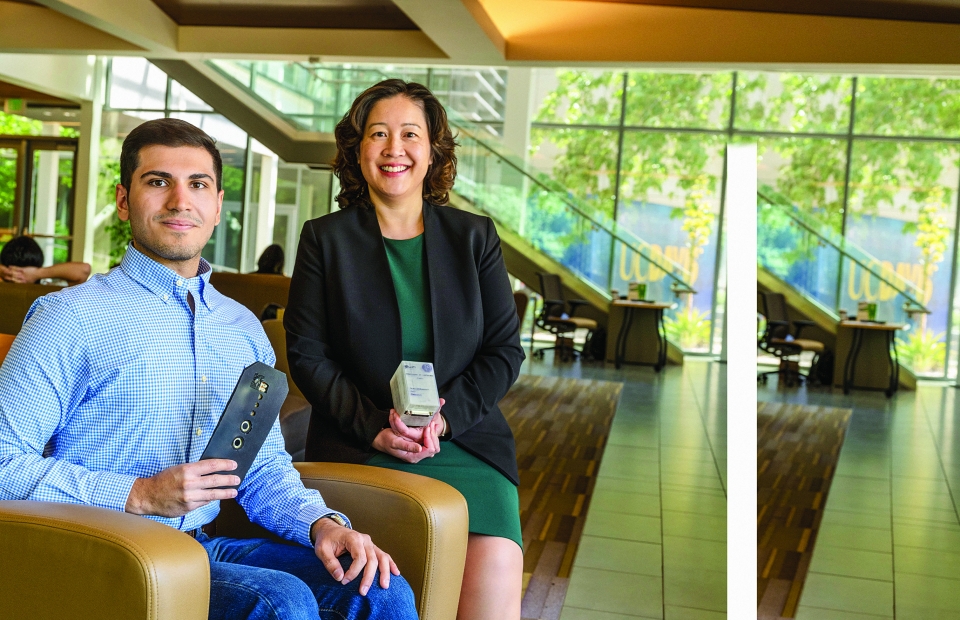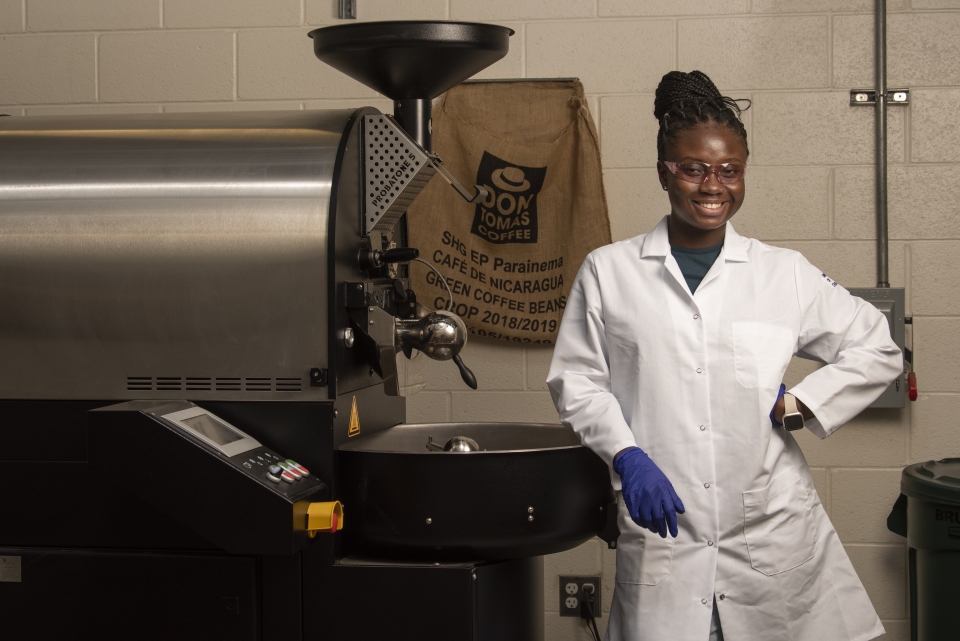
Innovating for our future
From our morning cups of coffee to our essential health care routines, the daily aspects of our lives are being studied—and improved—by UC Davis graduate students.
These scholars are committed to taking the extra step in education and discovery, all while assisting their professors and teaching undergraduates.
With a boost from the funds provided by philanthropy, graduate students have even more opportunity to answer knotty questions, explore new avenues of research and make important contributions to their fields.
Biodegradable, color-changing display devices
Imagine a medication that changes color when it expires. Such an innovation could help save lives.
Peifen Lyu ’19, Ph.D. ’25 has created a magnesium-based nanoscale optical device that dissolves inwater and changes colors in displays. It creates a color change across several applications, such as a coating for pills or as sensors in environmental science for testing different chemical compositions.
“What’s unique about our materials’ choice is it has a really broad range of applications, from environmental science to health care and data encryption,” said Lyu, who is a student in the lab of Chancellor’s Fellow and Associate Professor Marina Leite in the Department of Materials Science and Engineering. The Chancellor’s Fellows program has been supported by annual donors for 22 years and provides unrestricted funding to faculty working on innovative research.
Because it is made of magnesium, which can be absorbed through skin, this innovation can also be used for skin implants that change colors while measuring different health factors. Since the material is absorbed, there would be no need for a procedure to insert or remove it.
Devices created for photonics—the study and applications of light—are often made with materials like silver, gold, or copper, but these are expensive or require several processes for recycling. Magnesium, the eighth most abundant element on the Earth’s crust, is far less costly and is biodegradable through a green chemistry reaction.
“Magnesium is a fantastic material to control the electromagnetic spectrum. Plus, it is an earth-abundant and biodegradable material that can be used for many applications,” said Lyu. “We were able to shrink the dimensions of magnesium into nanometers and fabricate color pixels that can show a different range of hues than what is currently possible.”
While the work is still underway, Lyu said their model is highly scalable and will be easy to apply to future inventions.
“It’s really exciting to get to work on these kinds of projects that can have a lot of impact in my field: functional materials,” said Lyu.
An invention for monitoring fetal oxygen levels
The winners of the 22nd annual Big Bang! Competition, Kourosh Vali Ph.D. ’24 and Regina Hoang M.B.A. ’23, helped develop a noninvasive tool that accurately determines a baby’s well-being in the womb.
Built in the lab of Soheil Ghiasi, professor of electrical and computer engineering, the invention is called a transabdominal fetal pulse oximeter (TFO) and can measure a baby’s blood oxygen saturation levels. It can also help prevent unnecessary Caesarean sections.
“This breakthrough device will make labor and delivery safer for moms and babies,” said Vali, a computer engineering student. “It will let doctors know when the fetus’ blood oxygen saturation levels are low—a red flag that indicates the baby needs to come out right away or risk losing oxygen to the brain or organs.”
The competition, organized by the donor-funded Mike and Renee Child Institute for Innovation and Entrepreneurship, has been helping entrepreneurs start or grow business ventures for more than two decades through the competition, workshops, mentoring and networking opportunities.
“I believe in developing businesses that serve a bigger purpose in society,” said Hoang. “I’m very passionate about bringing the TFO medical device into hospitals as soon as possible, so that it can help women and children have better health outcomes.
”Vali and Hoang, team members of the Davis-based Storx Technologies, won the $20,000 first-place prize in the competition. They plan to use the prize money to conduct more market research and seek venture capital funding.
“This hands-on experience was wonderful,” said Vali. “It is an honor to work on this project that can have such an important impact for families.”

Filling an essential knowledge gap of the coffee industry
Coffee roasting is a crucial step in manufacturing and selling coffee. However, the exact chemical and kinetic changes that occur to coffee beans during the process are still relatively unclear.
That’s why Laudia Anokye-Bempah M.S. ’22, Ph.D. ’26 in biological systems engineering is working with experts at the UC Davis Coffee Center to create the industry’s first standardized coffee roasting chart.
“This work can be groundbreaking for the coffee industry,” said Anokye-Bempah. “Coffee roasting has been around for centuries, but it’s still not a clearly defined process. If we can provide this information to roasters it will make their work much simpler.”
There is currently no fixed roasting chart that companies can use to control the roasting process. The experiment, funded by PROBAT, Inc., will provide a standardized roasting chart that outlines the physical and chemical changes in the coffee beans throughout a roast process.
Anokye-Bempah is analyzing parameters like moisture content, color, titratable acidity and other chemical measurements to determine how coffee beans change throughout every step of roasting.
“If we understand what is happening during a roast, we will be able to control the process and outcomes,” she said. “We are working on a solution so that roasters obtain the coffee they desire.”
The Coffee Center at the College of Engineering is a donor-supported multidisciplinary research center to address the challenges and needs of the coffee industry and brings in scientists from around the world—including Anokye-Bempah, who came to study at UC Davis from her home country Ghana.
“It feels great to be a part of the team. We get invited to many conferences and people always recognize UC Davis and the work we do at the Coffee Center,” she said.



